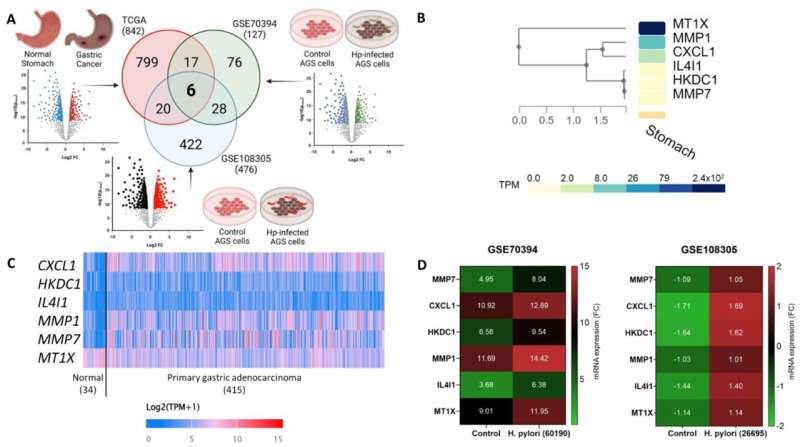This article has been reviewed according to Science X's editorial process and policies. Editors have highlighted the following attributes while ensuring the content's credibility:
fact-checked
peer-reviewed publication
trusted source
proofread
Gut bacteria can aggravate stomach cancers, study finds

Bacteria lurking in human digestive system can assist growth of stomach tumors, say researchers from the University of Sharjah, the United Arab Emirates.
They found Helicobacter pylori (H. pylori) can trigger the "turning on" of a cancer-causing gene in the body that contributes to the development and progression of stomach cancer.
The scientists, through detailed in vitro and in silico analyses, revealed that the protein CXCL1, which is often associated with different types of cancers, has a higher expression in H. pylori-infected gastric cancer cells and cancer tissues as compared to healthy subjects. Their study is published in the International Journal of Molecular Sciences.
Helicobacter pylori (H. pylori) are bacteria that may infect the stomach and are the main cause of stomach ulcers (peptic ulcers). More than half of the world's population have the H. pylori infection, but it is mostly benign in nature. Among all the patients infected with H. pylori bacteria, almost 20% could develop gastric cancer.
This particular class of bacteria, the scientists say, are not always bystanders, but they can be tumor-accomplices assisting cancer sells' development.
They suggest that when H. pylori infect the body, they trigger an epigenetic process called DNA hypomethylation causing an overexpression of CXCL1 in infected cells.
"This study of epigenetics shows us how certain environmental factors can turn 'on' or turn 'off' the function of specific genes, causing normal cells to transform into cancer cells," said University of Sharjah's Associate Professor Jibran Sualeh Muhammad, the head of the research project producing the study.
The bacteria were discovered several decades ago, but still, researchers have been unable to understand the exact mechanism of how the bacterial infection can lead to the development of gastric cancer, says Dr. Muhammad. "Our study for the first-time reports that this bacteria induces CXCL1 overexpression due to induced epigenetic changes in the human stomach," he notes.
Stomach cancer is the fifth most commonly diagnosed cancer in the world, with an estimated 768,793 people dying from stomach cancer worldwide in 2020, according to the International Agency for Research on Cancer (IARC).
The IARC has also classified H. pylori as a class I carcinogenic cause of gastric cancer.
The bacteria make their way to the stomach through direct human interaction or consumption of contaminated food or water.
"Most of the time, H. pylori infection is acquired during childhood and then it usually persists for life unless treated," the researchers write. "Chronic infection with H. pylori accounts for approximately 89% as the cause of gastric cancer cases worldwide, but this percentage varies greatly between places around the world."
Although the carcinogenicity of H. pylori is well documented, this is the first study to explore the bacteria's effect on the epigenetic regulation of CXCL1, say the scientists.
They are positive that their study could help identify and treat gastric cancer in early stages.
"Since epigenetic events such as DNA methylation happen early in the sequence; H. pylori-induced CXCL1 hypomethylation can likely be utilized as an early detection biomarker," they write, adding that demethylation drugs could be used to reverse this epigenetic modification.
"We could use these biomarkers to diagnose patients at high risk of cancer and start the treatment well before they reach the advanced stage," Dr. Muhammad explains.
Asked what approach he and his co-authors could suggest for treating or preventing cancer following their discovery of the malignant role these microbes can play, Dr. Muhammad said their research could lead to the detection "of this molecule CXCL1 and the induced epigenetic changes could be beneficial in diagnosing the condition at early stages of development."
Currently, Dr. Muhammad says, there are few FDA-approved drugs for blood cancer treatment to reverse the DNA methylation-induced epigenetic changes in cancer cells, "and those could be utilized in clinical studies to investigate their effects on gastric cancer treatment."
Stomach cancers are treated with traditional chemotherapy, but the medicine could target only the cancerous cells and not the normal cells with bacteria-induced epigenetic changes, says Dr. Muhammad.
"Antibiotic therapy is essential for bacterial eradication and should be followed by traditional chemotherapy. However even eliminating the bacteria does not reverse the H. pylori-induced epigenetic changes, hence, additional treatment strategies such as epidrugs might be needed as adjuvant treatment," he adds.
The environment, according to Dr. Muhammad, plays a crucial role to the extent that "if one twin is living in a polluted or stressful environment, the chemicals she is exposed to could activate cancer-promoting genes or deactivate cancer-inhibiting genes leading to cancer formation. On the other hand, her sister with the same DNA but living in a clean and stress-free environment remains healthy.
"In my laboratory here at Sharjah Institute for Medical Research, we are focusing on investigating the specific genes that are being 'turned on' or 'turned off' because of the environment leading to cancer development."
Dr. Muhammad says the next phase in their research is to plan animal experiments after obtaining proper ethical approvals. "Due to limitations in resources, clinical trial seems unlikely," he adds.
More information: Jibran Sualeh Muhammad et al, DNA Methylation-Mediated Overexpression of CXCL1 in Helicobacter pylori-Induced Gastric Cancer: In Silico- and In Vitro-Based Identification of a Potential Biomarker for Carcinogenesis, International Journal of Molecular Sciences (2023). DOI: 10.3390/ijms24010795

















